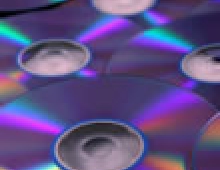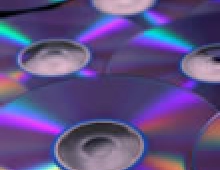
'Parallel' migration to blue-laser DVD urged
Proposal put together by a Hollywood studio suggests that blue-laser-based high-definition DVD recorders will initially become available as VCR replacements only in the Japanese market. The proposal, written before the last meeting of the DVD Forum and obtained by EE Times, predicted that the rest of the world will have to wait until 2004 or 2005 before seeing blue/red laser players that can play back red-laser-based high-definition content and blue-laser prerecorded HD-DVD media.
At the DVD Forum's steering committee meeting in February, content owners — Warner Bros. in particular — lobbied for a new and more efficient compression algorithm that would allow a full-length movie to fit within the 8.5-Gbyte capacity of today's DVD-9 disk, rather than an immediate migration to blue-laser-based HD-DVD.
But the studio proposal defines "a parallel migration path to the full blue-laser-based technology" that the studio expects to be required "for the recording of broadcast HDTV signals, as well as for distribution of prerecorded motion pictures with extra materials in the longer term."
'Unacceptable' licensing
While some industry sources claimed that the MPEG-4 codec is preferred by many members of the DVD Forum's steering committee, one Hollywood studio executive said, "The recent MPEG-4 licensing structure unveiled by MPEG LA is so upsetting and so unacceptable to us [that] we're committed to looking for alternatives to MPEG-4." The controversial licensing scheme sets a "use fee" of 2 cents per hour for playback of every stream, download or other use of MPEG-4 video.
The executive stopped short of saying, however, that studios are dismissing MPEG-4. "We've seen more than a few codecs for possible HD-DVD applications," he said. "But we see MPEG-4 [with its object-based interactive capabilities] as more than a codec. MPEG-4 has a potential for one-stop authoring" for electronic delivery of content (for streaming or downloading over the Internet) and physical media like HD-DVD disks.
The DVD Forum is not the place to discuss the price for new DVD technologies or intellectual property (IP), the studio executive went on. But the forum "cannot, will not, choose a codec" without some consideration of "the cost of licensing."
Many steering committee members hold IP essential to MPEG-4 video. "Clearly, some DVD Forum members may feel that it's imperative to select MPEG-4 for HD DVD," observed an executive at a consumer electronics company.
But some silicon vendors, such as LSI Logic Corp., see the 7-Mbit/second MPEG-2 specification as more commercially viable than MPEG-4. Timothy Vehling, senior director of marketing for consumer products at LSI Logic's broadband entertainment division, said, "Our customers have developed HD encoders using our DVx technology." He maintained that Domino — LSI Logic's multistream, multiformat, network media processor — is "also extremely well-suited to efficiently encoding HD, while making for a very good HD decoder in consumer applications."
Compression choices
Meanwhile, a host of new compression technologies is emerging. Since late last fall, Hollywood studios have taken a serious look at movies compressed in four different video compression algorithms, including MPEG-4 and wavelet.
Among the non-MPEG-2 compression schemes the studios have tested for red-laser HD-DVD applications are DemoGraFX's algorithm, a discrete-cosine-transform-based coding featuring much higher precision than MPEG, and iVast Corp.'s MPEG-4 technology. Pulsent Corp. is also planning to show off its new object-based video coding to Hollywood studios soon, said CEO officer Adityo Prakash.
According to the studio executive, the best-case scenario for HD-DVD is to study several compression technologies before the next steering committee meeting, scheduled for June 4. "We should have enough technology discussions by then so that the steering committee can either accept or deny the proposal."
But the studio proposal defines "a parallel migration path to the full blue-laser-based technology" that the studio expects to be required "for the recording of broadcast HDTV signals, as well as for distribution of prerecorded motion pictures with extra materials in the longer term."
'Unacceptable' licensing
While some industry sources claimed that the MPEG-4 codec is preferred by many members of the DVD Forum's steering committee, one Hollywood studio executive said, "The recent MPEG-4 licensing structure unveiled by MPEG LA is so upsetting and so unacceptable to us [that] we're committed to looking for alternatives to MPEG-4." The controversial licensing scheme sets a "use fee" of 2 cents per hour for playback of every stream, download or other use of MPEG-4 video.
The executive stopped short of saying, however, that studios are dismissing MPEG-4. "We've seen more than a few codecs for possible HD-DVD applications," he said. "But we see MPEG-4 [with its object-based interactive capabilities] as more than a codec. MPEG-4 has a potential for one-stop authoring" for electronic delivery of content (for streaming or downloading over the Internet) and physical media like HD-DVD disks.
The DVD Forum is not the place to discuss the price for new DVD technologies or intellectual property (IP), the studio executive went on. But the forum "cannot, will not, choose a codec" without some consideration of "the cost of licensing."
Many steering committee members hold IP essential to MPEG-4 video. "Clearly, some DVD Forum members may feel that it's imperative to select MPEG-4 for HD DVD," observed an executive at a consumer electronics company.
But some silicon vendors, such as LSI Logic Corp., see the 7-Mbit/second MPEG-2 specification as more commercially viable than MPEG-4. Timothy Vehling, senior director of marketing for consumer products at LSI Logic's broadband entertainment division, said, "Our customers have developed HD encoders using our DVx technology." He maintained that Domino — LSI Logic's multistream, multiformat, network media processor — is "also extremely well-suited to efficiently encoding HD, while making for a very good HD decoder in consumer applications."
Compression choices
Meanwhile, a host of new compression technologies is emerging. Since late last fall, Hollywood studios have taken a serious look at movies compressed in four different video compression algorithms, including MPEG-4 and wavelet.
Among the non-MPEG-2 compression schemes the studios have tested for red-laser HD-DVD applications are DemoGraFX's algorithm, a discrete-cosine-transform-based coding featuring much higher precision than MPEG, and iVast Corp.'s MPEG-4 technology. Pulsent Corp. is also planning to show off its new object-based video coding to Hollywood studios soon, said CEO officer Adityo Prakash.
According to the studio executive, the best-case scenario for HD-DVD is to study several compression technologies before the next steering committee meeting, scheduled for June 4. "We should have enough technology discussions by then so that the steering committee can either accept or deny the proposal."


















